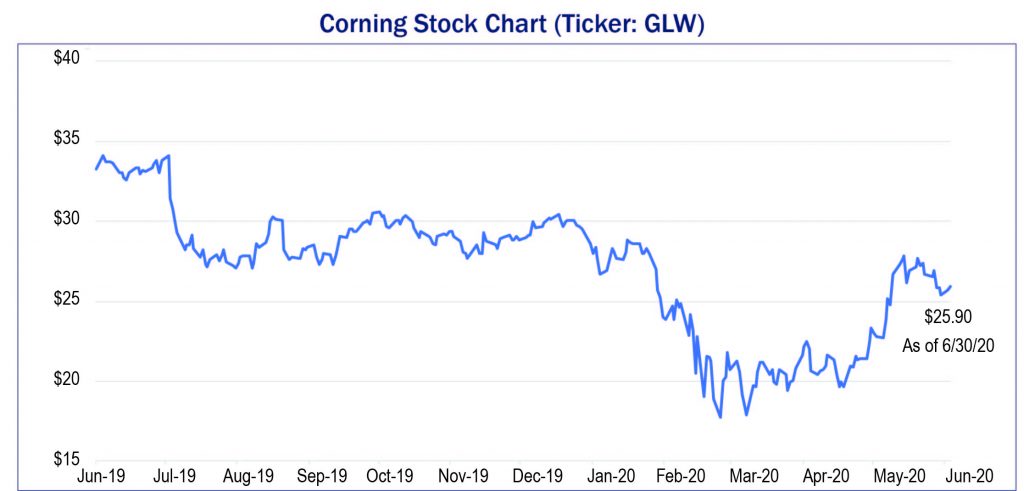Company Spotlight: Corning, Inc. (Ticker: GLW)
By Barbara Rishel
Corning’s fascinating history as a specialty glass manufacturer goes back 170 years. It was the partner of choice for Thomas Edison to manufacture the bulb-shaped glass encasement for his NEW incandescent lamp in 1879. Headquartered in Corning, NY, Corning’s products and innovations touch many different aspects of our lives; some in ways you might not expect. Some of the earlier inventions include cathode ray tubes (CRTs) for TVs in the early days of television in the 1950s, PYREX, Corning Ware and Corelle cookware, Steuben Art Glass and windows on the Hubble Space Telescope. Corning’s glass has been on every manned U.S. space flight since 1962. More recent inventions include flat screen TV glass, fiber optics, bendable glass for watches/wearables, antimicrobial glass for touch screens and high-quality vials for vaccines and healthcare.
Corning operates in five segments: Optical Communications (30% of sales), Display Technologies (30% of sales), Specialty Materials/Advanced Optics (15% of sales), Environmental Technologies (15% of sales) and Life Sciences (10% of sales). The company holds market leadership positions in all its major end markets, generates positive cash flow and has a dividend yield of 3.4%. Corning’s history of innovation continues to this day, as the company invests 8-10% of revenues every year to research and development in order to discover new ways to utilize glass in our everyday lives.
Optical Communications: The invention of fiber optics in 1970 transformed the company and revolutionized the telecommunications industry. Optical fiber is made of glass fibers slightly thicker than a strand of human hair and can transmit millions of bits of information per second via photons (pulses of light) rather than electrons. Corning is the world’s leading manufacturer of fiber optics, which is the core of network that enables users to transmit data at ever increasing higher rates of speed. One of the most important aspects of any technology, whether it is a cellphone, personal computer or a notebook (iPad), is how quickly and efficiently we are either receiving or delivering data. The increased demand for reliable and fast connectivity, especially as more people are working and playing remotely, has put pressure on our current networks. The transition to the next generation of wireless technology, 5G, will require more bandwidth. The network we all use for our technology devices is comprised of many different parts, including cell towers, servers, spectrum, etc. but it all needs to be connected—and fiber optics connect them all.
Display Technologies: Making glass for personal entertainment devices for consumers has been one of Corning’s core competencies for decades. Corning manufactures flat panel display glass LCD (liquid crystal display) for TVs, Personal computer monitors, electronic notebooks and cellphones. Corning invented the flat panel glass, and its continuous manufacturing improvement processes enable its products to keep getting larger, thinner and more lightweight with better clarity and higher resolution. The latest and greatest TV you did not know you needed is called the 8K- a large screen high performance viewing experience so vivid, so lifelike, you would swear you are actually part of the action.
Specialty Materials and Advanced Optics: This segment is focused primarily on one of Corning’s newest inventions, Gorilla Glass, which is a lightweight, durable protective cover for smartphones and consumer electronic devices. Gorilla Glass is now on five billion devices around the world. The automotive market is upgrading car interiors with innovative Gorilla Glass to provide clear, tough and lightweight windows and sunroofs. Windshields with Gorilla Glass are perfect for digital displays and are light enough to reduce overall vehicle weight which ultimately saves fuel. Consoles and dashboards that respond to touch, connect with the web and offer a better viewing experience than conventional glass. Corning has also developed antimicrobial Gorilla Glass for touch screens which contains an ionic silver component which serves as an agent to keep the glass clean. It has not been tested yet on COVID-19, but it is registered with the EPA.
Environmental Technologies: Corning is also a leader in specialty ceramics and has pioneered ceramic substrate technology for catalytic converters for pollution control. Since the Clean Air Act was implemented in 1970, virtually every automotive company in the world today relies on Corning technology to control exhaust emissions.
Life Sciences: Because of the purity and reliability of their products, Corning manufactures glass for the healthcare industry and is a major supplier to the National Institute of Health (NIH). Corning’s comprehensive equipment solutions are used in academia, genomics, biotech and pharmaceutical labs. Currently there is an industry shortage of vials for vaccines, and Corning has been chosen by the U.S. Government for a capital infusion of $204M to expand its domestic manufacturing capacity of vials to support the vaccination and treatment of patients.
Corning is always evolving and is well-positioned for future growth in several emerging trends, especially in telecommuting, video streaming and home entertainment systems, as well as new areas in automotive and healthcare. In addition, Corning’s historical ability to drive technological change through continued innovation has rewarded shareholders over the long run and represents a solid position in our portfolios.




